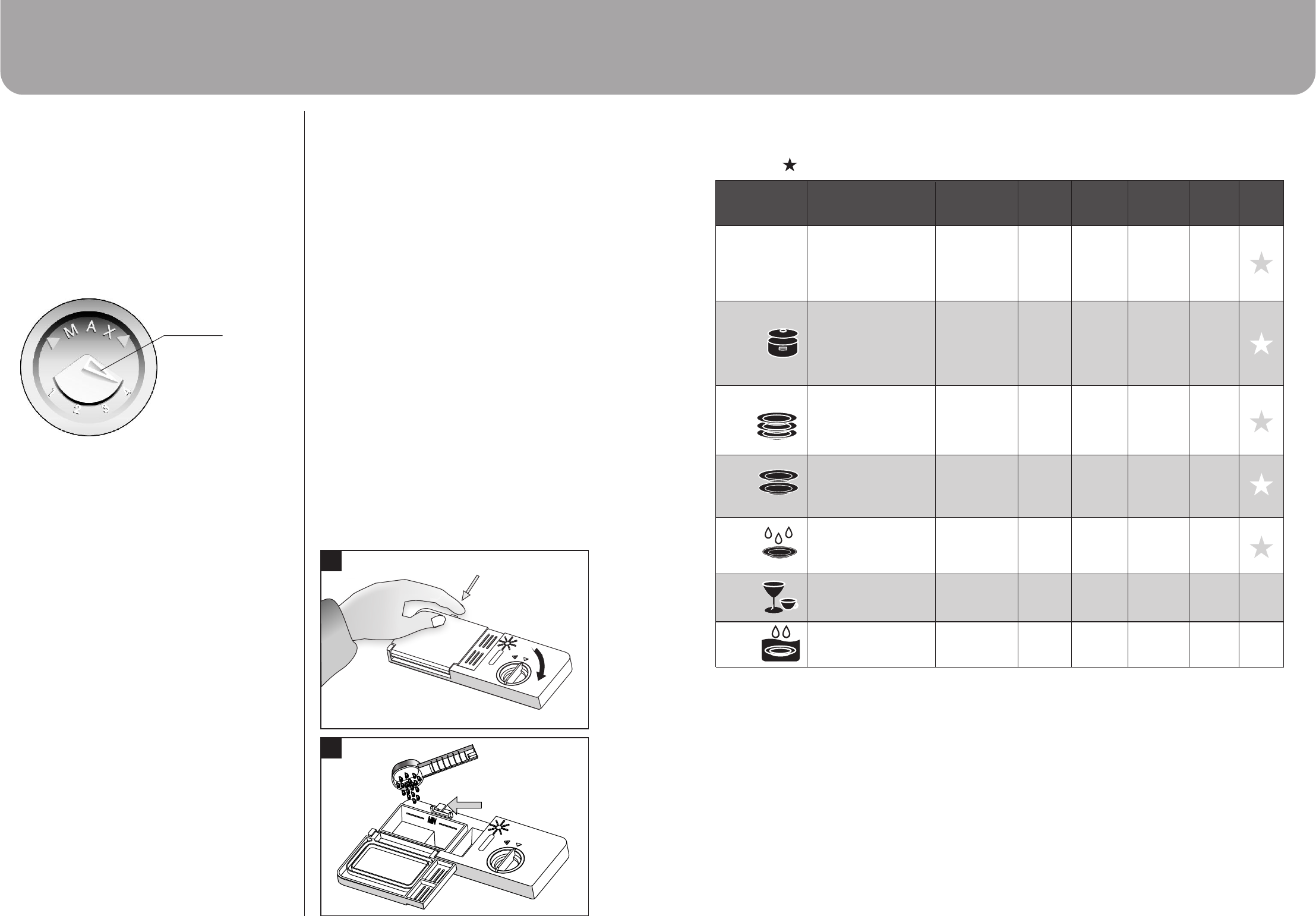
Using Your Dishwasher
Page 10
Adjusting the Rinse Aid Dispenser
The rinse aid dispenser has four scales. Always start
with the dispenser set on "3". If spots and poor drying
are a problem, increase the amount of rinse aid
dispensed by removing the dispenser lid and rotating
the dial to "4". The recommended setting is "3".
(Factory value is "3".)
NOTE: Increase the dose if there are drops of water or
lime spots on the dishes after washing. Reduce it if
there are sticky whitish stains on your dishes or a
bluish film on glassware or knife blades.
Adjust lever
(Rinse)
Detergents
There are 3 sorts of detergents:
1. With phosphate and with chlorine
2. With phosphate and without chlorine
3. Without phosphate and without chlorine
Normally new pulverised detergent is without
phosphate. Thus the water softener function of
phosphate is not given. In this case we recommend to
fill salt in the salt container even when the hardness of
water is only 6 °dH. If detergents without phosphate
are used in the case of hard water often white spots
appear on dishes and glasses. In this case please add
more detergent to reach better results. Detergents
without chlorine do only bleach a little. Strong and
coloured spots will not be removed completely. In this
case please choose a program with a higher
temperature.
Concentrated Detergent
Based on their chemical composition, detergents can
be split in two basic types:
Conventional, alkaline detergents with caustic
Ÿ
components
Low alkaline concentrated detergents with natural
Ÿ
enzymes
The use of“normal” washing programs in combination
with concentrated detergents reduces pollution and is
good for your dishes; these wash programs are
specifically matched to the dirt-dissolving properties
of the enzymes of the concentrated detergent. For this
reason “normal”wash programs in which
concentrated detergents are used can achieve the
same results that can otherwise only be achieved
using “intensive” programs.
Detergent Tablets
Detergent tablets of different brands dissolve at
different speeds. For this reason some detergent
tablets cannot dissolve and develop their full cleaning
power during short programs. Therefore please use
long programs when using detergent tablets, to
ensure the complete removal of detergent residuals.
Detergent Dispenser
The dispenser must be refilled before the start of each
wash cycle following the instructions provided in the
wash cycle table. Your dishwasher uses less
detergent and rinse aid than Conventional
dishwasher. Generally, only one tablespoon of
detergent is needed for a normal wash load. More
heavily soiled items need more detergent. Always add
the detergent just before starting the dishwasher,
otherwise it could get damp and will not dissolve
properly.
Adding detergent to Dishwasher
If the lid is closed: press release button. The lid will
Ÿ
spring open.
Always add the detergent just before starting each
Ÿ
wash cycle.
Only use branded detergent aid for dishwasher.
Ÿ
Push latch to open
1
2
Page 15
Using Your Dishwasher
STARTING A WASHING PROGRAM
Wash Cycle Table
NOTE: Star ( ) means the need to fill rinse into the Rinse Aid Dispenser.
11 - 14.5
Detergent
pre/main
Cycle Selection
Information
Program
Running
time
(Hrs/Mins)
Water
(L)
2:40
Energy
(Kwh)
1.1 - 1.4
Rinse
Aid
Auto
5/27.5g
5/27.5g
5/27.5g
For soiled loads,
pots, pans, casserole dishes
and dishes that have been
sitting with dried food on
them for a while.
all such as
Pre-wash(50°C)
Pre-wash
Wash (65°C)
Rinse
Rinse
Rinse (55°C)
Drying
Pre-wash(50°C)
Wash (50°C)
Rinse
Rinse (65°C)
Drying
Wash (40°C)
Rinse
Rinse (45°C)
20g.
/
Pre-wash (40°C)
Autowash(50-60°C)
Rinse
Rinse(70°C)
Drying
2:37
2:41
54
1:10
1.2
1.4
0.45
0.8
22
16
5/27.5g
Rinse
Rinse (50 )
Drying
Pre-Wash
Wash (55°C)
°C
2:20 0.85 13.6
8
12
Description
of Cycle
Pre-wash
Wash (40°C)
Rinse
Rinse (60°C)
Drying
/
8
4
0.01
Pre-wash
Heavy
Normal
(AS/NZS 2007. 1 )
Intensive
Rinse
Rapid
Soak
For the heaviest soiled loads,
such as pots,pans,casserole
dishes and dishes that have
been sitting with dried food
on them for a while.
For heavy soiled loads,
such as pots, plates,
glasses and lightly soiled
pans. Standard daily cycle.
For normal soiled loads,
such as plates, glasses,
bowls and lightly soiled
pans.
For dishes that need to be
rinsed and dried only.
A shorter wash for lightly
soiled loads that do not
need drying.
To rinse dishes that you
plan to wash later that day.
NOTE:
* AS/NZS 2007.1: This programme is the test cycle.
The information for comparability test in accordance with AS/NZS 2007.1, as follows:
Capacity: 14 setting
Ÿ
Position Upper basket: Adjust to lower position.
Ÿ
Rinse aid setting: 3
Ÿ
Open the door slightly 50mm to assist in drying of the dishes after every wash.
Ÿ














